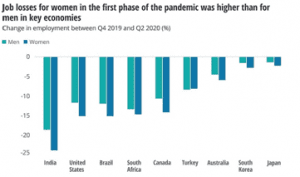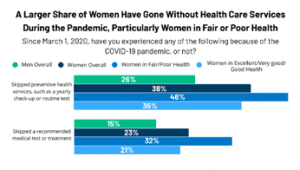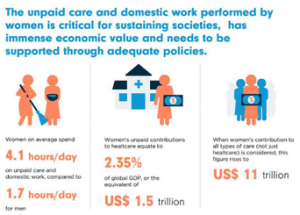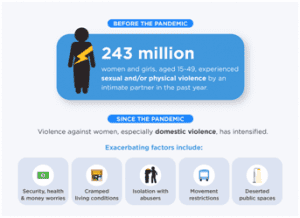THE CONTEXT: The COVID-19 pandemic has harmed health, social and economic well-being worldwide, with women at the very core of it. The poorest and the most marginalized, including women and girls, face more risks without the means to absorb the economic shocks and mitigate the health crisis. The following article intends to highlight the plight this pandemic has infused on women.
PLIGHTS OF THE PANDEMIC: ANALYSIS
Women tend to be the backbone of society during crises, even as they are also more likely to face the disproportionate impacts of such events. The Covid-19 pandemic is no different. It has severely exacerbated existing gendered barriers, widened India’s gender gap in the workforce, and affected (overwhelmingly female) caregivers and frontline workers.
ASPECT
KEY FINDING
IMPACT/AFTERMATH
EMPLOYMENT OPPORTUNITIES
Women were more affected than men by employment issues. Women made up just 24% of those working before the pandemic, yet accounted for 28% of all those who lost their jobs.
- Compounded economic impacts are felt especially by women and girls who are generally earning less, saving less, and holding insecure jobs or living close to poverty.
- From past experience and emerging data, it is possible to project that the impacts of the COVID-19 global recession will result in a prolonged dip in women’s incomes and labor force participation, with compounded impacts for women already living in poverty.

HEALTH AND SANITATION
About 16% of women (an estimated 17 million if extrapolated) had to stop using menstrual pads, and more than one in three married women were unable to access contraceptives.
- Health pandemics can make it more difficult for women and girls to receive treatment and health services.
- Globally, women make up 70 percent of the health workforce and are more likely to be front-line health workers, especially nurses, midwives and community health workers.

- The provision of sexual and reproductive health services, including maternal health care and gender-based violence related services, is central to the health, rights and well-being of women and girls.
CARE WORK
Indian women already do almost three times more unpaid work than Indian men, and the survey showed a 47% increase in unpaid labour for women and a 41% increase in unpaid care work for women.
- Before COVID-19 became a universal pandemic, women were doing three times as much unpaid care and domestic work as men. This unseen economy has real impacts on the formal economy and women’s lives.

DOMESTIC VIOLENCE
There has been a rise in instances of violence, sexual, physical and mental against women. The National Commission for Women (NCW) has recorded a more than twofold rise in gender-based violence.
- Women from historically marginalised groups (Muslims, migrants, single/separated/divorced), were more affected than the average woman. Conditions on the ground are likely to worsen for those women (such as Dalit women and transgender individuals) who bear the brunt of social discrimination.

- Judicial, police and health services that are the first responders for women were overwhelmed, had shifted priorities, or are otherwise unable to help. Civil society groups were affected by lockdown or reallocation of resources.
- Cases under the Right to live with dignity (Article 21) rose to 77% from 35%. Such cases could pertain to discrimination on the basis of gender, class, or caste or all three of them combined.
SHRINKING OF SOCIAL CIRCLE
Isolation and containment of women during lockdown.
- The avenues for liberty of freedom and expression four woman especially coming from the tier two and the tier three cities in India was limited before the pandemic.
- This aspect got further attenuated due to the COVID induced lockdowns which inflicted several mental and psychological issues on the life of women in India.
- This could be due to the increased workload in the houses unlimited opportunities for employment outside then home premises.
CURBING THE PLIGHTS OF THE PANDEMIC: WAY FORWARD
ECONOMIC
- Removal of barriers that prevent full involvement of women in economic activities, equal pay and equal opportunities, social protection schemes that factor in existing biases, financing for women entrepreneurs and mechanisms to promote women’s self-employment.
- Enlist Women on MGNREGA job cards to increase the total number of person-days to meet women’s demand for job opportunities.
- Strengthen the resilience of SHGs by focusing on their economic recovery and market linkages via the existing Deendayal Antyodaya Yojana: National Rural Livelihoods Mission.
o SHGs could also provide technical and managerial training to help women develop the skills needed to run small businesses digitally.
HEALTH
- Special attention needs to be given to the health, psychosocial needs and work environment of frontline female health workers, including midwives, nurses, community health workers, as well as facility support staff.
- Particular attention needs to be paid to health care services for older women, and gender-based violence survivors, as well as antenatal, postnatal care and delivery services, including emergency obstetric and newborn care.
- The government needs to implement easy access to products like sanitary pads and contraceptives, especially in such testing times.
- The government can build upon and accelerate its existing efforts through Accredited Social Health Activists (ASHA) workers, Mission Parivar Vikas, and other schemes to strategically focus on contraceptive usage.
RECOGNISING THE UNPAID LABOUR
- Women’s unpaid care work has long been recognized as a driver of inequality. It has a direct link to wage inequality, lower income, poorer education outcomes, and physical and mental health stressors.
- Support measures in response to COVID-19 need to go beyond workers who hold formal sector jobs and include informal, part-time and seasonal workers, most of whom are women.
- This is particularly necessary for female dominated spheres such as the hospitality, food and tourism sectors, now at a standstill due to confinement measures by governments.
GENDER-BASED VIOLENCE
- It is important for national responses to include specific communications to the public that justice and the rule of law are not suspended during periods of confinement or lockdown. Gender- based violence prevention strategies need to be integrated into operational plans of the justice and security sectors for the crisis, and statutes of limitations on offenses, particularly sexual violence offenses, should be suspended.
- A joint programme of the National Commission for Women (NCW), Delhi Police and Tata Institute of Social Sciences, (TISS) Mumbai.
- The NCW is implementing the project with Delhi Police and TISS and is committed to working on the issue of violence against women.
- In Spain, an instant messaging service with a geolocation function offers an online chat room that provides immediate psychological support to survivors of violence
OVERCOMING THE PLIGHTS OF THE PANDEMIC: THE CONCLUSION
A pandemic amplifies and heightens all existing inequalities. These inequalities in turn shape who is affected, the severity of that impact, and our efforts at recovery. The COVID-19 pandemic and its social and economic impacts have created a global crisis unparalleled to any such instance in the past. policymakers and stakeholders must include women and girls at the centre of recovery processes and listen to their needs, challenges and solutions. Empowering women and girls has proven to increase the health and well-being of the entire family and community.
QUESTIONS TO PONDER
- “Women tend to be the backbone of society during crises, even as they are also more likely to face the disproportionate impacts of such events.” Examine the statement in the light of the Covid-19 pandemic.
- “The pandemic undermined women and girls’ fundamental rights which could possibly have generational impacts.” In the light of this statement, discuss the multidimensional impacts of the covid-19 pandemic on women.

